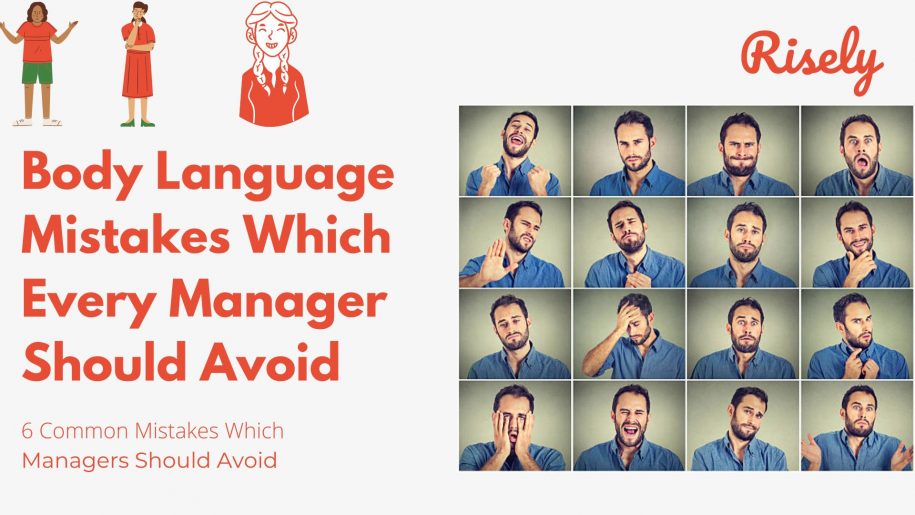6 Body Language Mistakes That Every Manager Should Avoid
It is a common misconception that managers should be hard-nosed and stern in their dealings with subordinates. However, managers need to have the right body language to build trust and create a positive working environment. In this blog, we have discussed body language, its importance, and what you should do to have the right body language while working as a manager. We have further discussed 6 body language mistakes commonly made by managers that they need to avoid.- 6 Body Language Mistakes That Every Manager Should Avoid
- What is Body Language?
- Importance of having the right body language for managers
- Body Language mistakes that every manager should avoid
- 1. Making facial expressions that indicate disagreement or anger
- 2. Overexposing yourself unnecessarily when talking to employees
- 3. Inappropriate or bad posture
- 4. Fidgeting and constantly moving around
- 5. Not being attentive to what’s being said
- 6. Displaying an appearance that sends the wrong message about your attitude or professionalism
- Conclusion
- Other Related Blogs
What is Body Language?
Body language is one of the key indicators of someone’s personality. It is more than just the way a person stands, moves, and even talks. It’s your body betraying verbal signals that stem from emotions. It is more than the physical body and appearance. It refers to what you convey to the other person by just being there without saying any word. Your posture, facial expressions, and hand gestures are all nonverbal messages which collectively form your body language. Small things like eye contact and handshake are also parts of it. You can use your body language to communicate your feelings and intentions. And, your ability to understand and interpret other people’s body language can help you to pick up on unspoken issues or feelings. For instance, when you are feeling angry or in a good mood, your body language can display the same changes. It’s easy to spot some of these behavioral traits by just looking at someone. After, knowing what it is exactly, it is important to understand why having the right body language is important for people in managerial positions.Importance of having the right body language for managers
A manager needs to have the right body language. The reason is that this creates an emotional connection between you and your employees. It’s not just about managing people It is also influencing their actions and building trust that cannot be achieved simply by telling them what they should do. It has to come from within and should reflect in your body language. Good body language skills can help managers influence and motivate their employees and improve productivity. It will allow managers to bond with their employees and present ideas with more authority and impact. By having it right managers can authentically project their brand of charisma, which is a powerful set of skills for any manager to develop. The importance of body language is that it assists us in better comprehending and decoding what someone is saying, as well as in comprehending other people’s moods and emotions. Having the right body language assures managers of the right message being passed on. it makes sure that they are interpreted correctly and eliminates the chances of miscommunications. But this doesn’t come inbuilt. It has to be built based on various experiences you get a long way. Expectations of people around you should also be incorporated in building your body language. While doing this managers are bound to make mistakes which can have a really bad effect on people’s perception of you. We accumulated 6 very dangerous but common body language mistakes from hundreds of managerial experiences to help all managers understand what to avoid. So, what are they?Other Interesting Reads
Body Language mistakes that every manager should avoid
1. Making facial expressions that indicate disagreement or anger
One of the biggest body language mistakes is openly showing disagreement and anger. This will only make your employees feel resentful and motivated to rebel, rather than work collaboratively. Even if you do disagree with something, you should still consider that input and should listen to it while your body language reflects the same. It is more than likely that you would have noticed your facial expressions as much as your employees. If they do not convey a positive message, it can lead to your employees avoiding meetings and hallway conversations. If your body language show disagreement or anger, it may make your employees hide information from you. It can lead them to alter information to please you. That can be harmful for your managerial position and it can also have bad effects on your image as a manager. Maintaining positive body language even when you disagree over things is the essence of a good manager.2. Overexposing yourself unnecessarily when talking to employees
Intimidating body language can also create a chilly atmosphere in the workplace, discouraging employees from speaking up and improving communication between management and staff overall. Although it is your right as an employer, there are certain things that you cannot do without permission as a manager. One of these things is overexposing yourself to employees more than necessary. People are not your puppets. They have their preferences and will tune out if they perceive you as invading into their personal space. Overdoing it can cause employees to question what you want or need from them or how much respect you truly have for them. Showing tall parts of yourself may confuse the employee. It may make them unsure about where to turn when dealing with you. They then start showing resentment towards the manager. It can also result in other employees being uncomfortable around the manager and they do not feel comfortable disclosing information either.3. Inappropriate or bad posture
Having a bad posture while communicating with your employees will make fall in the category of unprofessional and poor body language. Your employees may think that you are not considerate enough of them. Your postures should change according to your environment. For Example in meetings or discussions, you should sit or stand straight, look attentive. You should reflect that you are listening. On the other hand, while normal interactions like ones in the elevators or around the office, your Po should be relaxed and friendly. Having a good posture at all times will help you pass on the right perceptions of yourself to your employees. It will also reflect professionalism your professionalism. Likewise, it may also help you in building a rapport with your employees. You should be extra careful about your posture as it gives the first impression of your well-being when someone comes to see you.4. Fidgeting and constantly moving around
A restless manager can be interpreted as one with no control over self. Managers are expected to maintain some discipline around themselves and set an example for their employees. Restlessness here can entirely bash that idea of discipline and will take away the seriousness and professionalism from the role. Therefore, a mistake like that should be avoided by a manager.5. Not being attentive to what’s being said
This happens during office meetings or in open dialogue with employees. This can result in missed opportunities for problem-solving and tension building. Both of these will run counter to the objective of a productive workplace. Even if you are not able to pay attention you should at least show that you are by your body language. Lack of attention towards people you work with may badly affect your trustworthiness. Giving people direct eye contact when they talk, nodding your head when someone is speaking, and tilting your head slightly to encourage them to speak more are just a few examples of nonverbal signals that you should use while in a conversation or meeting. These will assure the other person that you are attentive to what they are saying.6. Displaying an appearance that sends the wrong message about your attitude or professionalism
As we also discussed earlier, managers are expected to lead by setting an example. They should be the ones their employees look up to for taking inspiration about how to go ahead with their job. This includes inspiration over attitude and professionalism too. Therefore it is necessary that managers, through their actions spread out the right and the most appropriate message about their attitude towards their job and their professionalism. If managers show inappropriate attitudes towards their job and people around them and if they lack professionalism, these flaws will likely carry down to their employees. This will happen as employees will consider it to be accepted as their manager does so. This can ultimately create a very bad situation for managers and even their entire organization. Coming out of that situation will be extremely difficult.Conclusion
Body language is one of the key indicators of one’s personality. It helps people build perceptions about him/her. While working as a manager it is highly important to have the perfect body language. It should suit your job and correctly displays your discipline, attitude, and professionalism. Setting up perfect body language is highly tricky and but there is still something you can do about it. We believe that if a manager can avoid the 6 mistakes we have listed above in this blog, the chances of them giving out the wrong message of themselves through their body language will drop drastically. Avoiding these mistakes won’t make you a body language expert. But it will drop down the chances of you going on the wrong track.Send the right message to your team with your impeccable active listening skills
Download the free active listening toolkit to always remain attentive in conversations at work
Other Related Blogs
Building empathetic managers with Loren Sanders
Building Empathetic Managers with Loren Sanders Empathetic managers are the need of the hour as organizations are undergoing major changes including the introduction of AI into workflows and the threat…
Read this if you think you can run The Bear
Read this if you think you can run The Bear What if your favorite mom-and-pop deli is transformed into something high-end super quick? We are talking of The Bear, Carmy,…
When ‘Cooked’ Doesn’t Mean Dinner: A Manager’s Guide to Gen Z-Speak
When ‘Cooked’ Doesn’t Mean Dinner: A Manager’s Guide to Gen Z-Speak Are you unsure of what your team is talking about? Or yapping about, as they say? It’s not surprising.…
Can your team keep going without you?
Can your team keep going without you? What if you vanished? Alien abduction, probably. The method isn’t the matter here; it’s the impact. What if your team wakes up one…


